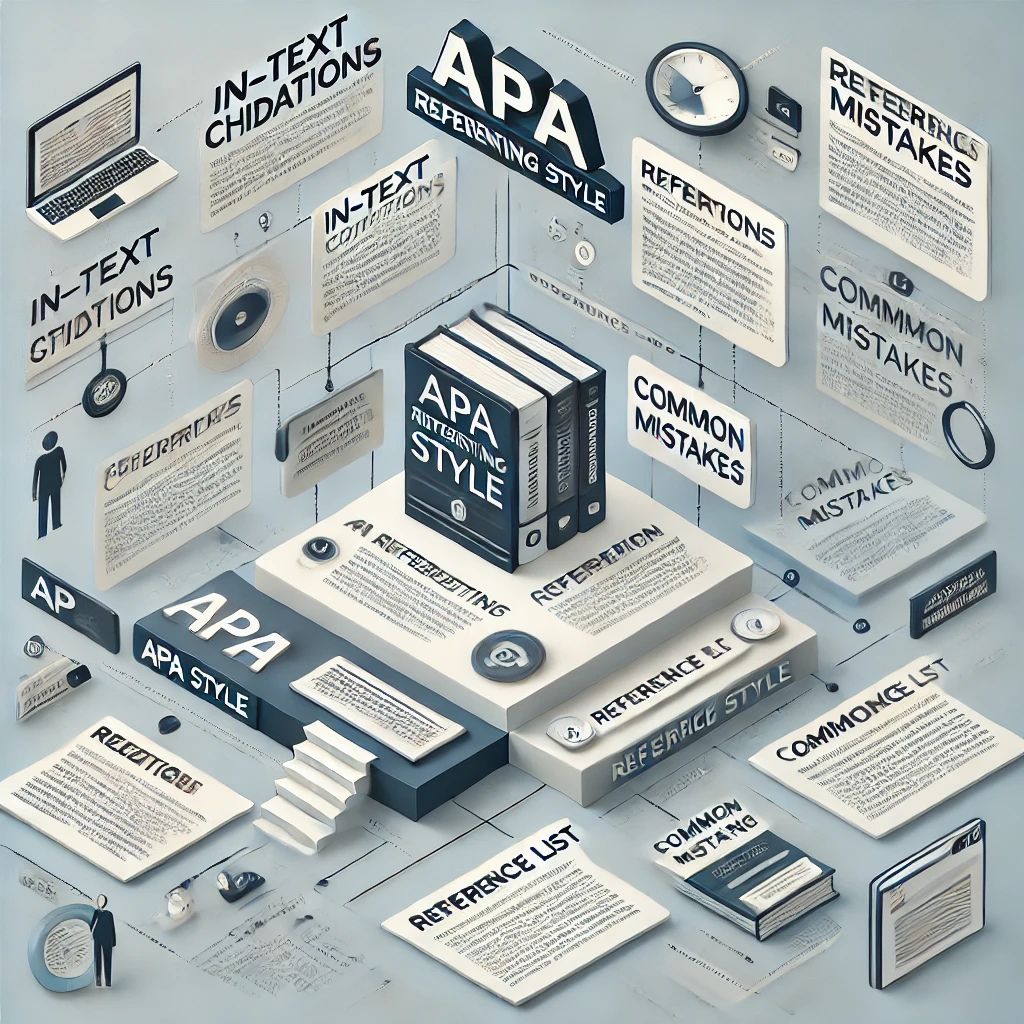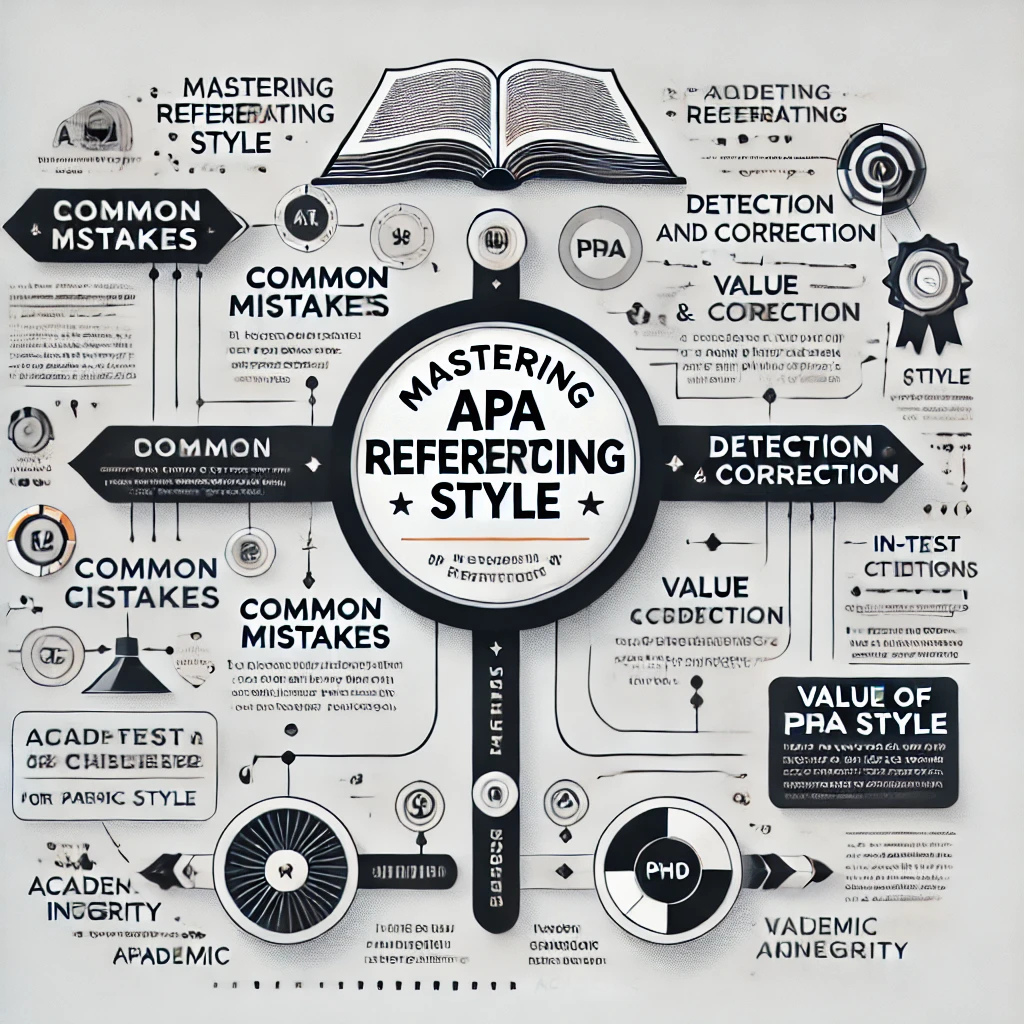Mastering APA Referencing Style: Common Mistakes, Detection, and Its Value
For PhD scholars, precision in referencing is not just a formality it’s crucial for maintaining academic integrity and enhancing the credibility of your research. The APA (American Psychological Association) referencing style is a cornerstone in academic writing, particularly in the social sciences, and its correct application is vital for your scholarly work. We, at PhD thesis writing services, through this blog, will outline common mistakes in APA referencing, how to detect and correct these errors, and the reasons why APA style remains an invaluable tool in academic research.
Common APA Referencing Mistakes
1. Formatting Errors in In-Text Citations
APA style requires specific formatting for in-text citations, including the author’s last name, year of publication, and page number for direct quotes. Missteps here can undermine the clarity of your references:
- Incorrect Example: According to Smith 2020, data analysis is crucial (p. 45).
- Correct Example: According to Smith (2020), data analysis is crucial (p. 45).
Ensure parentheses are correctly placed and punctuation follows APA guidelines. Accurate in-text citations are crucial for guiding your readers to your sources and supporting your research claims.
2. Inconsistent Reference List Formatting
Your reference list must adhere strictly to APA formatting rules, which includes italicizing book titles and journal names and ensuring proper punctuation:
- Incorrect Example: Smith, J. (2020). understanding data analysis. London: academic press.
- Correct Example: Smith, J. (2020). Understanding data analysis. London: Academic Press.
Check that each reference is formatted consistently, with italics for titles, correct capitalization, and proper use of periods and commas. Maintaining uniform formatting is essential when using the Harvard referencing style, as it enhances the professional presentation and credibility of your academic work.
3. Incorrect Identification of Authors
Accurate author identification is essential for proper citation. Common errors include listing author names incorrectly or in the wrong order:
- Incorrect Example: Smith, John and Jones, Sarah.
- Correct Example: Smith, J., & Jones, S.

For works with multiple authors, list up to 20 authors by their last names and initials. For more than 20, include the first 19 authors, followed by an ellipsis, and then the last author.
4. Formatting Dates Incorrectly
APA style requires dates to be enclosed in parentheses and followed by a period. Mistakes in date formatting can confuse readers:
- Incorrect Example: Smith, J. (2020, August). Understanding data analysis. London: Academic Press.
- Correct Example: Smith, J. (2020). Understanding data analysis. London: Academic Press.
Ensure dates are formatted correctly, with only the year included unless the specific month is essential.
5. Improper Citation of Online Sources
When citing online sources, APA style requires accurate URLs and, when necessary, retrieval dates:
- Incorrect Example: Brown, L. (2022). Data analytics trends. Available at: www.analyticsblog.com
- Correct Example: Brown, L. (2022). Data analytics trends. Retrieved from https://www.analyticsblog.com
Avoid “Available at:” and ensure URLs are complete. Include retrieval dates only if the content is expected to change over time.
6. Formatting References Incorrectly
APA style requires a hanging indent for reference entries, where the first line is flush left, and subsequent lines are indented. Common errors include:
- Incorrect Example:
Smith, J. (2020). Understanding data analysis. London: Academic Press.
- Correct Example:
Smith, J. (2020). Understanding data analysis. London: Academic Press.
Apply hanging indent formatting consistently throughout your reference list to ensure clarity and professionalism.

Detecting and Correcting APA Referencing Errors
To maintain the accuracy of your APA referencing, follow these strategies:
- Consult an APA Style Guide: Refer to a trusted APA style guide to understand the correct format and required elements for different sources. For more APA referencing tips, explore expert resources that help you avoid common mistakes and ensure adherence to APA standards.
- Cross-Check References: Verify each reference against the original source to ensure that author names, publication dates, and other details are accurate. This practice helps maintain the credibility of your citations.
- Utilize Referencing Tools: Consider using referencing management tools or software that can automate APA formatting. While these tools can be helpful, always review their output to correct any potential errors.
- Proofread Throughly: Carefully proofread your in-text citations and reference list. Look for inconsistencies or formatting errors and make necessary corrections to maintain accuracy.
Why APA Referencing Style is Valuable for PhD Scholars
APA style offers PhD scholars a structured and organized citation format that is essential for enhancing clarity and credibility in research. Key benefits include:
- Precision and Consistency: APA style offers a precise and consistent format for citations, which is essential for maintaining clarity in your research. This consistency helps readers easily locate and verify sources, reinforcing the reliability of your work.
- Structured and Organized Format: APA’s structured format aids in organizing references systematically, making it easier to manage extensive bibliographies. This organization supports a clear presentation of your research and is a key feature of our formatting service designed to ensure consistency and professionalism in academic writing.
- Emphasis on Timeliness: The APA author-date system highlights the publication year, which helps assess the relevance and currency of sources. This emphasis is particularly valuable in fields where recent research is critical to understanding current trends and developments.
- Upholding Academic Integrity: Proper citation using APA style is crucial for avoiding plagiarism and maintaining academic integrity. Accurate referencing acknowledges the contributions of other researchers and supports the credibility of your own research findings.
- Enhancing Accessibility: APA style facilitates access to sources by providing complete publication details and URLs for online references. This accessibility allows readers to locate and review the sources you have used, supporting the transparency and reproducibility of your research.
In summary, mastering APA Referencing Style is essential for PhD scholars aiming to produce rigorous and credible research. By avoiding common errors, we at PhD Research Assistance adhere to proper formatting and understand the advantages of APA style, enhancing the quality and professionalism of your scholarly work. Just as formulating a solid research Hypothesis is foundational to any study, correct application of APA referencing ensures the integrity and impact of your research in the academic community.
